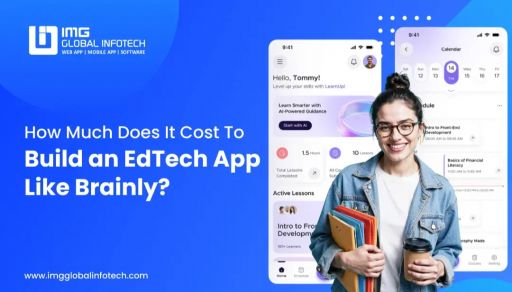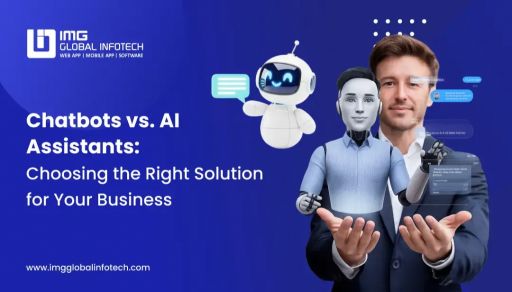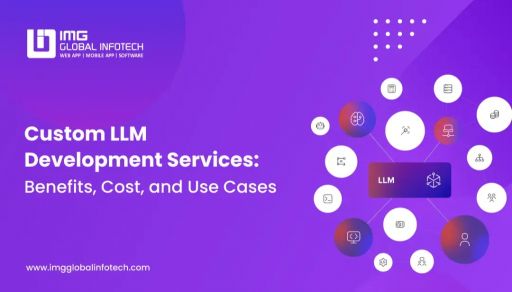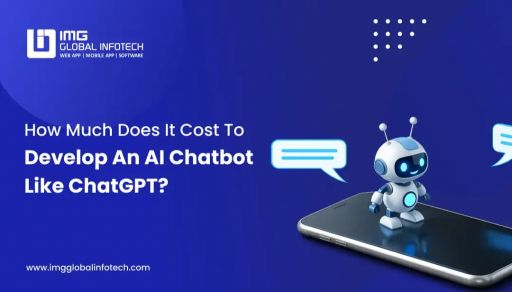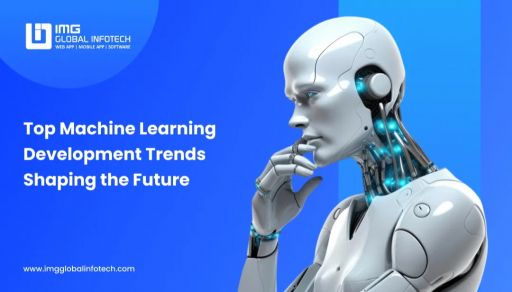AI Virtual Health Assistant Development Guide
Lokesh Saini
Sep 07, 2025
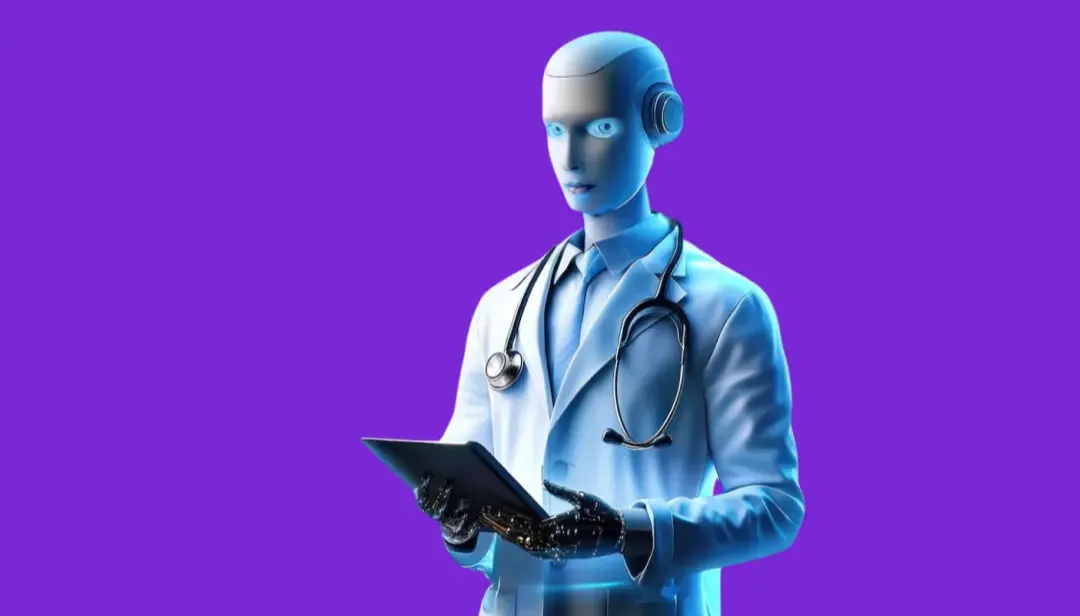
In our busy lives, sometimes we are careless about our health, especially in some cases. It's a major region to fall sick or capture any diseases due to this carelessness. That's why the healthcare industry is now quickly adopting the digital solutions under AI-powered apps. These AI assistant apps are very reliable because they can handle multiple activities like treatment plans, diagnostics, and patient care from virtual health assistant development using AI. Currently the AI health assistant apps are in heavy demand just because of integration with the latest technologies like NLP (Natural Language Processing) and ML (Machine Learning).
These apps can offer real-time health insights, medication reminders, virtual consultations, and medication reminders. You can also develop an ai health assistant app that can track the patient's progress with accurate results, but the main thing is how it would be made. Well, in this blog, let's explore AI-powered virtual health assistant development. We will also discuss various aspects of the process in this blog.
What is an AI Health Assistant App?
An AI Health Assistant App is an intelligent healthcare tool, facilitating users' access to practical health assistance. The AI health assistant app development relies on artificial intelligence to adapt users' data input into health assistance, diagnostic possibilities, and real-time health updates and alerts based mostly on what the user inputs.
Some key capabilities of an AI health assistant include:
-
Symptom Examination/Diagnosis: AI algorithms facilitate symptom database processing to confer potential diagnoses.
-
Medication Reminders: The app notifies clients as prescribed for dosage uptake.
-
Virtual Health Consultations: The app connects users to medical professionals via chatbots and/or video consultations for health advice, monitoring, and ongoing care.
-
Personalized Health Insights: The app provides users' interventions for nutrition, fitness, and mental health.
-
Remote Personal Monitoring: Patients with chronic conditions may be remotely monitored via patient wearable data collection.
Key Features of AI Virtual Health Assistants
Development of AI health assistant apps is transforming healthcare with sophisticated AI-enabled features. Such apps deliver far more than simple tracking—they give individuals personalized health information, real-time symptom evaluation, and telemonitoring in virtual healthcare assistant development.

-
AI-Powered Symptom Checking and Array
One of the strongest AI health assistant app functionalities is how it can evaluate symptoms and offer possible diagnoses in AI-based medical assistant development. Through machine learning, AI-powered symptom checkers examine symptoms input by users, cross-reference them against medical databases, and offer potential explanations.
This functionality allows users to make informed healthcare choices, directing them on whether or not to see a doctor or engage in self-care.
-
Personalized Health Tracking
AI health assistant apps monitor vital signs, sleep habits, activity levels, and eating habits based on data from wearable devices and user input from machine learning healthcare assistant development. Based on real-time health analytics, these apps give users personalized health information and AI-based recommendations, which assist them in developing better lifestyle habits.
Whether prompting daily steps or recommending dietary changes, these AI-generated insights keep users engaged and vigilant about their health by AI medical chatbot development.
-
Smart Medication Management
Medication compliance is important for people with chronic diseases, and AI health assistant apps facilitate it through intelligent medication reminders. These apps can give automatic reminders, monitor dosages, and detect possible drug interactions so that patients never forget a dose.
-
AI-Powered Appointment Scheduling and Reminders
Doctor visits can be a daunting task from an ai powered virtual health assistant, but AI health assistant apps make it easier by providing automatic scheduling and reminders of appointments.
The app synchronizes with the calendar of users, provides timely reminders, and even reschedules missed appointments to maintain continuity in healthcare management.
-
AI-Powered Mental Health Support
With greater emphasis placed on mental well-being, AI health assistant app development today includes AI-based mental well-being assistance in ai virtual health assistant. Guided meditation, mood monitoring, and CBT exercises are some of the features that aid in the management of anxiety and stress.
Behavioral patterns that signal possible mental health issues can be identified by AI algorithms, which then suggest early intervention techniques or offer access to mental health practitioners.
Steps to Develop an AI Virtual Health Assistant
You can develop an AI virtual assistant in healthcare organizations like clinics and hospitals by following these simple steps for the development process.
-
Clarify the Objectives
First, you need to specify the main objectives that you want in an AI virtual healthcare assistant. Whether it is tracking symptoms. sending medication reminders, and scheduling appointments from build ai assistant python. The best practice is to integrate with intelligent healthcare assistance for one or two use cases and increase the scale later.
-
Design the Patient Experiences
The main goal of building an AI virtual assistant in healthcare is not just setting up the automation but also providing complete assistance for these experiences to patients for ai health assistant development. That's why the design should also be created in the right conversational flow that provides guidance to patients on how they can use these virtual assistants. You can also integrate empathetic language in your virtual assistants.
-
Train the AI-Powered Virtual Health Assistant
It's time to select the right frontend, backend, and other necessary technologies that can help with virtual health assistant development. You need to train your AI virtual assistant that can define datasets quickly according to the clinical guidelines by the virtual health assistant. Then you need to test your virtual assistant on the basis of performance and functionality, especially for casual queries or emergency situations.
-
Integration of the Right Tech Stack
Let's take a look at the technology stack that will be required for the successful development of a digital healthcare assistant before we start the steps for a virtual medical assistant. We have given top AI engineers the tools they need to create healthcare assistants that are prepared for the future, from frontend and backend to data storage.
-
Unite Techniques of Security
As the AI-powered virtual health assistant deals with very sensitive patient data, ensure strong security measures are in place to achieve end-to-end encryption and security of the data in the healthcare virtual assistant. Further, implement role-based access control and, at minimum, have audit trails for all interactions with the smart health assistant.
-
Deploy, Monitor, and Scale
Deploy the AI digital health assistant on either a secure, healthcare-compliant cloud server or on a secure, on-premises server in the mental health virtual assistant. Provide the initial setup to a small group of professionals/a department and patients.
Track usage, accuracy, patient satisfaction, and other metrics. Assuming that a satisfactory course of action is in place and that patients are utilizing the assistant satisfactorily, then expand institutionally to other teams, departments, and patients.
Cost of Developing an AI Virtual Health Assistant
Developing an AI virtual health assistant mainly depends on various factors like the set of features, app complexity, development expertise, location, and hourly charges for building a virtual assistant for medical practice. Here is an average cost to develop an AI virtual health assistant:
Use Cases of AI Virtual Health Assistants
With HIPAA-compliant virtual assistants, healthcare service provision and management has changed forever, allowing patients to check symptoms, schedule appointments, and obtain reminders for medication/vaccination use, and in so many other ways from virtual assistant for healthcare. Take a look at some use cases:
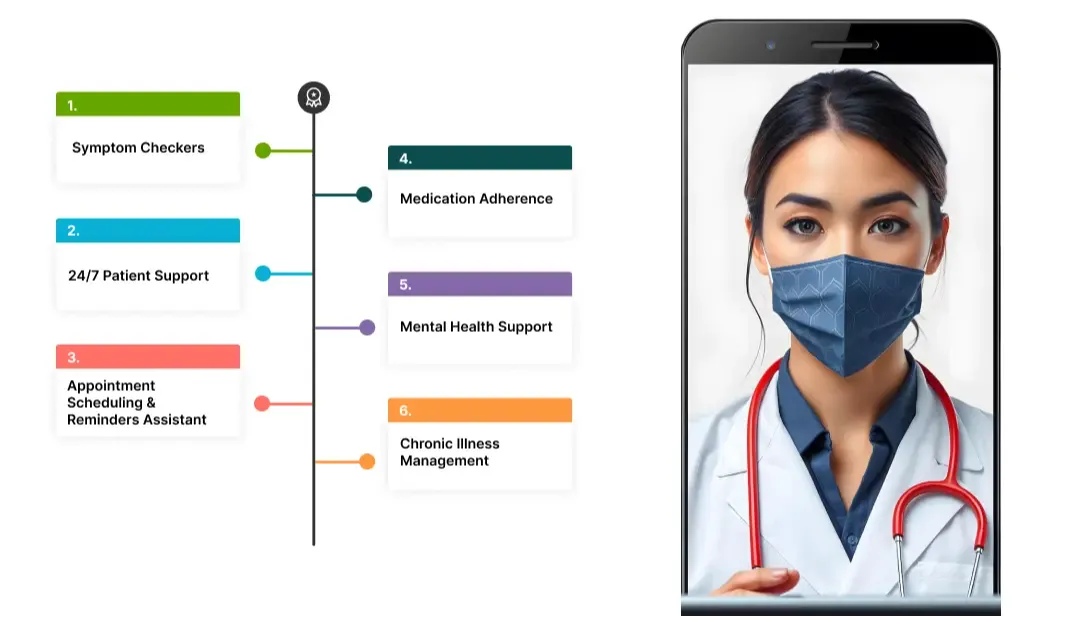
-
Symptom Checkers
Intelligent healthcare assistants can help patients get an idea of their health issue by describing their symptoms to the healthcare digital assistants. It will ask further questions to identify what the condition could be or simply suggest booking an appointment with the healthcare provider.
For example, if the patient describes a "chest tightness"-type symptom, the assistant will immediately appreciate the urgency and suggest consultation with a healthcare provider immediately.
-
24/7 Patient Support
Virtual assistants can work round-the-clock tirelessly without compromising efficiency or accuracy. Healthcare caregivers or hospitals can utilize them to answer general queries of patients and guide them to the right resources from virtual assistant development.
For example, a person who involuntarily develops a minor fever at midnight would now have access to a smart healthcare assistant for reassurance and advice without feeling worried till they see a doctor in the morning.
-
Appointment Scheduling & Reminders Assistant
Medical AI assistants will have the capability of managing appointments and easily rescheduling appointments and sending reminders for the appointments. For hospitals and clinics, AI virtual assistants automate manual work and reduce patient no-shows.
For example, a client with an appointment at 4 pm with a dermatologist receives a reminder on WhatsApp at 1 pm to confirm or immediately reschedule. In case they opt for the latter, the dermatologist gets to see other clients.
-
Medication Adherence
With patient assistants powered by AI, physicians and caregivers can make sure that patients adhere to medication consumption using periodic reminders. What's more, they have the prescription refill reminders for scheduling, which makes it easier for them to follow consumption.
For example, a diabetes patient gets daily reminders or alarms at a predetermined time for taking insulin and gives the reading of the sugar level to the assistant.
-
Mental Health Support
Through the use of an AI-based virtual health attendant, healthcare service professionals can provide talk-based assistance to those with mental issues such as depression, stress, and anxiety. As they have an attendant or friend to assist them, they will have direction on how to manage the situation.
For example, if a student has an examination 3 hours later, he or she can feel anxious beforehand, but the intelligent AI assistant will give them breathing exercises and motivational guidance on how to handle the situation.
-
Chronic Illness Management
Through healthcare virtual assistants that use AI technology, patients and healthcare service providers have been able to treat and manage chronic conditions like hypertension and asthma by continuously monitoring symptoms.
For example, a patient who has hypertension will be able to automatically enter their blood pressure and even receive notifications from sudden increases.
Benefits of AI Virtual Health Assistants
AI health assistant app development is revolutionizing the healthcare sector by enhancing patient care and automating medical procedures. These smart apps leverage sophisticated AI algorithms to diagnose illnesses, personalize treatment, and make healthcare easier. Here, we examine the most important advantages of AI health assistant apps and their role in changing contemporary medicine.
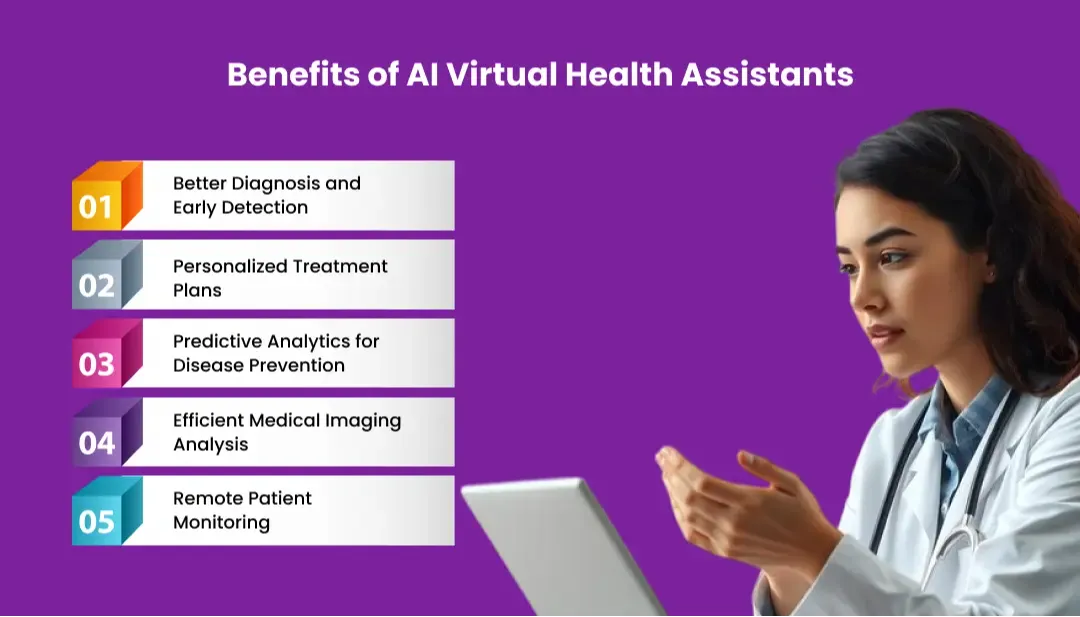
-
Better Diagnosis and Early Detection
Perhaps the most important advantage of AI health assistant apps is their potential for enhanced diagnostic accuracy and early disease detection. AI algorithms scour huge volumes of medical data, such as X-rays, MRIs, and electronic health records, to pick up on faint patterns that may go unnoticed by medical professionals to Build AI medical scribe. This results in quicker, more accurate diagnoses, enabling timely medical intervention that can save lives.
-
Personalized Treatment Plans
AI health assistant app building assists in the development of individualized treatment plans for patients. AI examines medical history, genes, and current health data to suggest treatments specific to every individual based on their needs in Healthcare app development.
-
Predictive Analytics for Disease Prevention
AI health assistant apps utilize predictive analytics to identify possible health threats at early stages. They scan large amounts of data to identify patterns and red flags of chronic diseases, cardiovascular diseases, and other conditions.
-
Efficient Medical Imaging Analysis
Development of AI health assistant apps has accelerated medical imaging analysis and accuracy. AI-based technology assists radiologists and pathologists in scanning and interpreting intricate images, minimizing human error and accelerating workflows.
-
Remote Patient Monitoring
Remote patient monitoring is simplified by AI health assistant apps through the continuous monitoring of vital signs and medical conditions. Wearables driven by AI capture real-time health data that enables physicians to identify early warning signs and act promptly.
How can IMG Global Infotech Help You Build AI Powered Virtual Health Assistants?
IMG Global Infotech is a premier AI app development company empowering healthcare organizations, hospitals, clinics, and individual healthcare service providers to leverage AI to its maximum by developing and building bespoke digital health assistants.
We have developed dedicated AI experts assistants who are knowledgeable on the healthcare industry, and track current and future healthcare trends to develop future-ready assistants and AI healthcare solutions that deliver interactive experiences for patients and maximum ROI for business.
Whether you want to build a virtual assistant for triaging symptoms, appointment booking, medication reminders, or a companion that reaches out and talks, we can build any with simple and engaging conversation flows.
Conclusion
Through this blog, we have explored the AI virtual health assistant development guide. We have also discussed several elements like the meaning, key features, technological stack, development process, average cost, and benefits of a virtual assistant in healthcare development.
You can also hire healthcare developers from IMG Global Infotech to get the optimized results. The custom AI virtual assistants in the healthcare industry can not only increase the ROI but also enhance the visibility of your business in the market as well.
Lokesh Kumar is the Digital Marketing Manager & SEO Content Strategist at IMG Global Infotech, a top-rated Web & Mobile App Development Company. With extensive experience in digital marketing, SEO, and content strategy, he specializes in boosting online visibility and driving organic growth for startups, SMEs, and global brands. Lokesh is passionate about creating SEO-friendly, user-centric content that not only ranks but also converts. His deep understanding of digital trends and search algorithms helps businesses thrive in a competitive online space.


